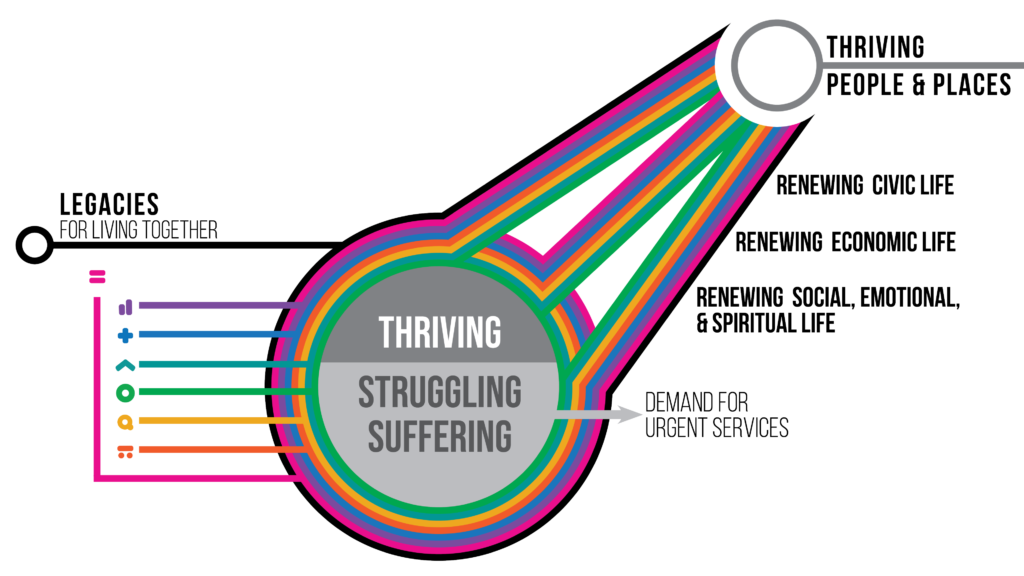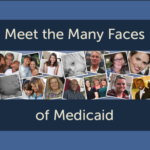Well Being Trust Releases Thriving Together: A Springboard for Equitable Recovery and Resilience in Communities Across America.
The Springboard Provides Communities and Local Government with Promising Actions in the Wake of Covid-19, Toward a Healthy and Just Nation Well Being Trust Releases Thriving Together: A Springboard for Equitable Recovery and Resilience in Communities Across America.
Oakland, CA (July 27, 2020) – Communities across the country have an immense reservoir of energy, courage, and imagination that can propel widespread local and nationwide action around a single unifying and measurable expectation: All people and places thriving—no exceptions. This is the unifying message of a new guide and web resource released by Well Being Trust (WBT), developed with funding from the CDC Foundation, and contributed to by leaders from more than 100 diverse organizations and communities.
Thriving Together: A Springboard for Equitable Recovery and Resilience in Communities Across America highlights scores of actions that communities, organizations, businesses, governments and funders can take in the wake of COVID-19 and other related threats to our nation. It is a practical resource for everyone wanting to help America heal through the trauma of 2020 and secure the vital conditions that all people and places need to thrive (i.e., a thriving natural world, basic needs for health and safety, humane housing, meaningful work and wealth, lifelong learning, reliable transportation, and belonging and civic muscle).
The work is rooted in four strategic imperatives: 1) affirm human dignity by establishing racial justice and full inclusion for all people as a daily, living reality; 2) strengthen belonging and civic muscle by working across differences for the well-being of people and places, which in turn, unlocks abundant assets of people and places; 3) expand all of the interconnected vital conditions with local stewards taking the lead, beginning with people and places that are struggling and suffering; and 4) solidify new legacies for living together by renewing civic life; economic life; as well as social, emotional, and spiritual life.
“To inform the COVID-19 response, the Springboard puts forward ideas, consistent with the social determinants of health, for anyone to spring into action and begin to improve their communities,” said Judy Monroe, MD, president and CEO of the CDC Foundation. “We are pleased to support this effort and look forward to it being advanced by communities and organizations across the country.”
The Springboard contains three sections to help changemakers spring into action:
- Changing Course Summaries—brief chapters focused on the vital conditions and selected topics, featuring “pivotal moves” that are locally-adaptable as high priorities for quick action.
- Paths to Renewal—point to larger and long-term ways of renewing Civic Life; Economic Life; and Social, Economic, and Spiritual Life, and feature “trendbenders” that can play out over the next decade.
- Advancing a Thriving Movement—reminds us of the momentum already underway in America to create thriving communities in a way that fits local culture and context.
“We inherit vital conditions from choices made by our predecessors—their legacies are the starting points for our lives. However, we possess enormous capacities to either continue or transform those conditions, for better or for worse. The work at hand is to define the imperatives that will shape our own legacies for the next generation—the legacies that will prepare us for future crises and define our identity as a people,” said Tyler Norris, MDiv, CEO of Well Being Trust. “America’s movement for well-being and justice can never be codified in a single playbook. Yet, it can spring forward with great force and direction if we pursue our priorities, together, to make change happen where it counts.”
The Springboard lifts up diverse voices that describes our nation’s current situation amidst COVID-19, and points to what all in America can do, together, to emerge from the compounding crises of 2020 with greater resilience, humanity, and direction. It highlights dozens of prospective actions to accelerate an equitable recovery and build resilience over time, including (among many others):
- Emergency funding for access to care—must be dedicated now to community-based organizations and clinicians treating individuals with mental health and substance use disorders. With demand for services soaring in the pandemic, it is essential to keep the doors open, lights on, and providers paid, to save lives.
- Organize Local Recovery and Resilience Accountability Councils— These Councils assure local control and coordination over the direction, actions, and accountabilities of federal, state, philanthropy, and business partners. These Councils can incorporate insights from similar, successful efforts, like Accountable Communities for Health and Ryan White Planning Councils.
- Uphold civil and human rights—S. history shows substantial benefits when we enforce established civil rights with respect to health care, education, employment, housing, transportation, voting, environmental protection, and other vital conditions—all of which still have significant room to improve.
- Focus on early childhood development—To attract and retain talented teachers, salaries should be increased and there should be more funding for high-quality home visiting programs. Forty years of research shows that these kinds of programs yield significant reductions in child abuse and neglect, reduction in ER visits, fewer behavioral and intellectual problems in children, and a heathier population.
- Make housing affordable—The cost of building affordable housing should be reduced by having state and local governments purchase and hold land with federal assistance. Policymakers should create renters’ insurance through payroll taxes, and create Rent Resilience Funds to cover rent for those who require assistance during economic downturns. We can prevent housing instability in the first place by encouraging corporations to provide subsidized housing for low-income employees.
- Boost household wealth—We should establish a standard for fair pay that is tied to the local cost of living; direct first-time homebuyer credits and match savings initiatives to households of color and low-income communities; and offer a debt bail-out for working families that matches the relief given to banks in 2008.
- Create Outdoor Classrooms—Schools that create outdoor classrooms can maintain physical distance to keep kids and teachers safe and, over the long term, studies show that exploring, playing, and learning in nature improves academic achievement.
- Assure equitable access to parks and open spaces—Cities can adopt a transparent, data-driven, community-led approach to improve the equitable allocation of public resources as part of park and urban open-space development. Parks can contribute to higher land values. The positive aspects of open space can only be created if their development is just, equitable, and inclusive in both process and outcome.
The Springboard organizes the things all people and places need in order to thrive and is embraced by a fast-growing network of people and organizations from across the nation. Thriving Together: A Springboard for Equitable Recovery and Resilience in Communities Across America is a project of Well Being Trust, coordinated with Community Initiatives and ReThink Health. This project conducted between May and June, 2020 is an evolving work. Support for the project was provided by the CDC Foundation.
So far, it includes the views and opinions of more than 100 contributors, but the Springboard does not necessarily reflect the official position of any individual or organization. It is now ready to spring to life with your input. To access the full report and resources, go to www.thriving.us. To reach the team and engage, write input@thriving.us
# # #
Well Being Trust is an impact philanthropy dedicated to advancing the mental, social, and spiritual health of the nation. Created to include participation from organizations across sectors and perspectives, Well Being Trust is committed to innovating and addressing the most critical mental health challenges facing America, and to transforming individual and community well-being. www.wellbeingtrust.org. Twitter: @WellBeingTrust






